|

Autumn 1997 (5.3)
Pages 36-38
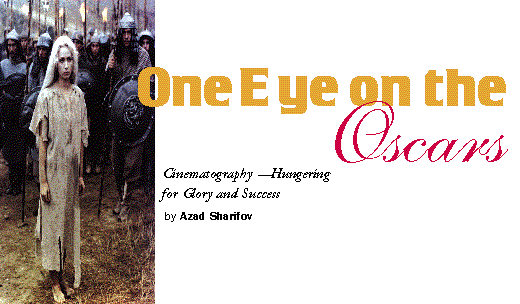
Even the ushers in Baku cinema
houses know that you need at least 99 different film specialists
to produce a reasonably successful movie. You need a director
with assistants, a screenwriter and an administrative team adept
at delegating tasks. You need several writers and editors, including
one who writes dialogue. Of course, there's the design team:
you need an artistic director and a group of talented artists
to paint kilometers of wood and canvas.
Add to your list costume and
makeup artists, and a hair-dresser. Critical to any operation
is a team of cameramen with several workers assigned simply to
turn lights and projectors on and off for each scene. Plus, you
can't do without a chief sound technician and assistants with
their colorful array of tangled microphones and cords.
Above all, you need actresses
and actors. Fresh, pretty faces are a must. They're not hard
to find in Baku-you can identify them easily in any commercial
shop or supermarket. But watch out for the fat ones. Frankly,
that's sometimes a problem here.
Then you need to match male
actors with the actresses. It's better to choose tall men; short
men don't look good on screen. Nor should they be past middle-age.
They should have sensitive, expressive eyes, and full eyebrows,
though not as thick as Brezhnev's. And of course, they should
have sparkling white teeth-just like TV ads.
The Need for Doubles
Unlike Western actors, each major Azerbaijani actor or actress
needs a double. For example, our movie stars don't know how to
use their fists for fighting. Their first inclination is always
to pick up a stone. Nor are they adept with knives. They're just
now beginning to learn how to shoot, but so far, they do it only
with their eyes shut.
Most don't know how to drive
a car since they don't even own a "Zaparogitch" (the
smallest and worst car available in the country). I'm not referring
to difficult turns on steep mountain curves where a mistake could
land you in a river bed 300 feet below. I'm speaking about just
normal driving in city streets (although these days, that's not
so easily done in Baku either).
Nor can our actors jump from
burning buildings like they do in Hollywood. I don't mean skyscrapers,
none of which we have yet, but even those five-storied buildings
we call "Khrushevka," which were built during Khrushev's
time.
What is a movie without such
a huge team? Judge for yourself, and then ask, where can we,
a small republic tucked between the mountains and the sea, find
such a team of film professionals?
Lack of Filmmakers
In Azerbaijan, we have oil workers galore-drillers, operators,
geologists, processors-you'll find as many as you wish. Azerbaijan
wasn't called the "Oil Academy of the Soviet Union"
for nothing. Our oil industry workers have drilled in Algeria,
Vietnam, Siberia, and Tatarstan. No one is more adept at putting
out oil fires than we are. In the agricultural realm, we can
also provide the best cotton growers, wine makers and even flower
growers. But trying to find so many professionals in the film
industry is a gargantuan task. Nor are we able to invite other
workers from such film empires as America, India or Mexico-they
live too far away and are too expensive.
|
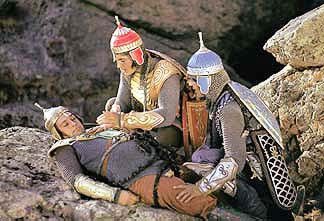
Left: Scenes from "Painful Roads"
(Azabli Yollar), 1982. Directed by Tofig Ismayilov. This movie
is based on an Azerbaijani fairytale of "Malik Mammad and
the Three Princes".
Right: The princes face with three devils.
The movie was selected by American film producers in 1989 as
one of the 17 best Soviet movies.
|
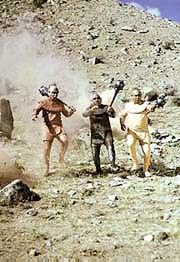
|
History of Training
Few people alive today ever had the chance to watch filmmakers
at work in Baku 80-100 years ago. The movie makers of the 20s
were said to be skillful but, unfortunately, had no professional
education. Then came those who seemed to have an adequate education
but didn't have natural talent. No doubt, that's why we borrowed
Russia's "classic stars" and used to make them our
own films. That was the trend up until the 80s.
Then we started looking for
filmmakers with the unusual combination of traits-educated, talented,
skilled, full of energy and with a modern outlook. An impossible
assignment! But such are the requirements of cinema! This was
the task we set for ourselves some 30 years ago, when our Azerbaijani
cinema masters were young, and not loaded with honors, governmental
rewards, international prizes and prestigious posts. It was a
time when our film professionals hungered for glory and success.
Blame in Dark Hallways
And so it was, whether out of luck or misfortune, that the Soviet
government assigned me as Director of this worrisome and ambitious
world-Film Production and Film Distribution of Azerbaijani Cinema.
Actually, they didn't give me much of a chance to decline the
offer. Though they seemed friendly enough, they, somehow, managed
to pressure me with the party's traditional "You have to!"
without really saying it.
At night, my inner voice warned:
"Stay away" from the film studio. I knew that if, by
some chance, a movie suddenly became successful, the government,
which had great respect for cinema, would simply ignore me. Fine!
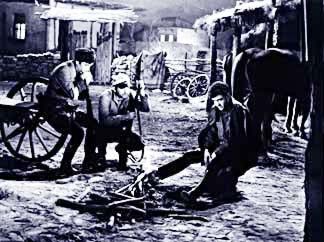  But, God help me, if a movie not only
was unsuccessful but turned out to be ideologically out of kilter.
Then I knew they would track me down in some dark hallway. But, God help me, if a movie not only
was unsuccessful but turned out to be ideologically out of kilter.
Then I knew they would track me down in some dark hallway.
Left: From "I Want Seven Sons"
(Yeddi Oghul Istaram), 1970. Directed by Tofig Taghizade. Reminiscent
of an American cowboy scene.
And thus it happened, once. On my own initiative I had decided
to shoot Gara Garayev's ballet, "The Seven Beauties"
with the assistance of Moscow's choreography masters. It turned
out to be a difficult project because of misunderstandings between
the director and the ballet group.
Then one beautiful day, the
government found the time to watch the ballet film along with
a documentary about the previous session of the Party which had
already been edited and was ready to be shown.
Silver in the Film
The "Seven Beauties" pleased them very much. But then
while watching the documentary, they discovered some of the speeches
of the 35 to 40 delegates and guests had been deleted. They insisted
that the missing speeches be added back into the film. It didn't
matter that the film director insisted that the documentary would
be too long, boring and uninteresting. "What may seem uninteresting
to you is of great interest to the people!" the voice of
the ideological boss interrupted.
So, in desperation, the director
confessed that the tape had already been "burnt out,"
which means that the unused film had already been sent back to
Moscow for recycling so that the silver could be extracted. But
no one listened. Everyone cringed at the word "burnt."
Then they found me in a dark hallway and demanded an explanation.
Shortly afterward, a special
commission that included members of the State Security Committee
(SSC) was created, and an investigation was begun. The very next
day when I arrived at the studio, several strange people were
there, reminding me of those all too familiar detective films.
An inquiry was held. The situation became even more serious than
in a bad movie. It was very hard to explain that removing silver
from the film was just a normal technological process and that
the films were always sent to Moscow for this process after the
film was completed.
I can't say that this was the
only cinematographic sin I committed. I always seemed to have
an urge to cross out something in the script, or to cut a couple
of "extra" scenes. Once I couldn't resist deleting
a section that was 17 minutes long. It turned out to be a bad
mistake as the scene had been suggested by the director, who
thought he was the new Fellini.
Off to Moscow!
Finding highly qualified personnel has always been one of our
difficulties in cinema. We managed to get the USSR State Cinema
Board to approve a plan whereby we would receive an adequate
number of admissions to the Moscow Institute of Cinematography,
the Leningrad Institute of Film Producers, and advanced courses
for scriptwriters and producers.
Back home, we received an incredible
response from young people, all dreaming of becoming Hollywood
movie stars. When we started the selection process, they all
arrived at the studio on time. We immediately an-nounced that
the usual methods of bribery were forbidden. There would be no
rubles slipped into envelopes, no valuable gifts, no telephone
calls from people in high places, and no offers of friendships
with important persons. The only criteria for admission would
be one's own abilities and experience.
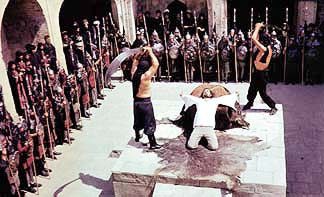  Left: From "Babak," 1979. Directed by Eldar
Guliyev. "Babak" is an epic movie about an Azerbaijani
martyr-hero who revolted against the Arab invasion of the 7th
century. Above: Execution scene when Babak is killed. Rasim Bal-
ayev plays Babak. Left: From "Babak," 1979. Directed by Eldar
Guliyev. "Babak" is an epic movie about an Azerbaijani
martyr-hero who revolted against the Arab invasion of the 7th
century. Above: Execution scene when Babak is killed. Rasim Bal-
ayev plays Babak.
It wasn't an easy job.
For each vacancy, the commission had to select three candidates,
and these young people, in turn, had to compete amongst themselves.
And so it was that in 1979, a group of Azerbaijani students finally
graduated from the Moscow University of Cinematography. Despite
the fact that Azerbaijan gained a number of good actors, such
as Hamida Omarova; in general, our efforts were not very successful.
But in 1985, we decided to repeat the experiment and announced
another competition. There was no need to advertise. Many mothers
brought their sons and daughters to the film studio. For 15 vacancies,
we chose from 150 candidates. All of them could easily recite
the literary works of Nizami, Pushkin, Omar Khayam and Shakespeare.
They could all sing and dance and move gracefully across the
stage.
Between 1980 and 1989, 27 Azerbaijanis graduated from the Moscow
Institute of Cinematography and received diplomas as producers,
cameramen, artists and technicians. Eighteen graduated from the
Leningrad Institute of Film Directors and became specialists
in sound, cinematographic equipment, and film editing. Eight
students graduated from special cinematography courses. These
experts now make up the core of our personnel at the national
film studio.
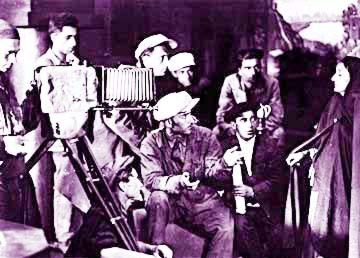  Projectors in the Caucasus Projectors in the Caucasus
Left: From "Ismat," 1934. Directed
by Mikayil Mikayilov. The photo shows the camera crew in the
process of filming the story about Azerbaijan's first woman pilot-Leyla
Mammadbeyova.
We ran into another
problem, however. We had equipped the entire country (including
the mountain regions) with film projectors, but there was no
one to repair and maintain the equipment. Soon we found out that
the Cinema College in Kaliningrad was the best place for technicians
to study.
We made business contacts with the college and agreed to send
50 students to study there each year. The arrangement was intended
for three years. But we soon realized that many students from
the countryside didn't know Russian well enough, and their knowledge
of mathematics and physics was also weak. Instead, we ended up
inviting teachers from the college to come to Baku during the
summer. As a result, we eventually had more than 100 technicians
working throughout the countryside, even in remote villages high
in the Caucasus.
Several years later, we achieved a few successes with a number
of state prizes and awards at international cinema festivals.
And now finally, we can boast of an Oscar with our own Rustam
Ibrahimbeyov's screenplay for "Burnt by the Sun," directed
by Nikita Mikhalkov and awarded "Best Foreign Film"
in 1995 from Hollywood! Finally, we had arrived!
Today's filmmakers, encouraged
by attention from the government, are working on a few more films.
Who knows, maybe one of these films will win another Oscar. After
all, this is cinema, and with cinema anything is possible. At
least, we can dream! If the main criteria for winning were passion,
then for sure, that's something we have plenty of.
Azad Sharifov is head of the
Journalism Department of the Higher Diplomacy College of Azerbaijan.
He is the former Chair of Azerbaijan State Cinema Committee.
From Azerbaijan International (5.3) Autumn 1997.
© Azerbaijan International 1997. All rights reserved.
Back to Index
AI 5.3 (Autumn 1997)
AI Home | Magazine
Choice
| Topics
| Store
| Contact
us
|






